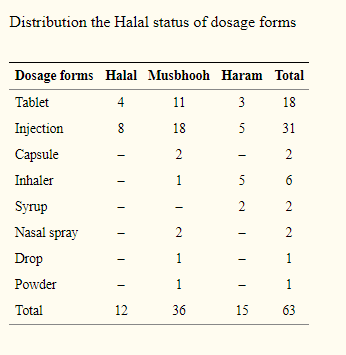So since you raise a good question, here are two answers, first lets talk about drugs = medications,
M who are directly engaged in manufacturing, distributing, dispensing, & prescribing medications are responsible for ensuring that pharmaceutical products are Halal & Tayyib.1/n https://twitter.com/hindutweetz/status/1308504352840011776">https://twitter.com/hindutwee...
M who are directly engaged in manufacturing, distributing, dispensing, & prescribing medications are responsible for ensuring that pharmaceutical products are Halal & Tayyib.1/n https://twitter.com/hindutweetz/status/1308504352840011776">https://twitter.com/hindutwee...
This is an extremely challenging task in food production. It is possible that some people believe that medicines are vital and that Haram substances may be used in certain circumstances as they were permitted and tolerated in Islam.
The lack of awareness and knowledge of Halal status of medications among M consumers and patients could be the root of this complex issue related to the concept of Halal-Tayyib pharmaceuticals.
there is a growing demand among M consumers for Halal medications.
there is a growing demand among M consumers for Halal medications.
So as per the study The proportions of Halal, Mushbooh, and Haram products were at 19.1%, 57.1%, and 23.8%, respectively. The percentage of active ingredients for cardiovascular/endocrine products that were assessed as Haram was 5.3%; for respiratory medications,
It was only 1.1%. For excipients, 1.7% and 4.8% fall under the category of Haram for cardiovascular/endocrine products and respiratory products, respectively. Ethanol and magnesium stearate were found to be the common substances that were categorized as Haram and Mushbooh.
Any substances including foodstuffs and medicines that are permissible and lawful to be consumed are classified as Halal. but if you look at the above facts you can see its clear violation of their book!
The Halal status could not be assessed for 73 out of 240 active ingredients. This was due to the difficulty in obtaining accurate information related to their origins.
ok so now coming to drugs = addictive substance.
ok so now coming to drugs = addictive substance.
Drinking is sinful, Islamic thought evaluates other mind-altering substances based on whether they “curtain the mind.” (In this sense, “curtain” means to veil or cover.)
In 2014, the Grand Ayatollah Sayyad Mohammad Sadeq Hussaini Rohani in Qom, Iran, issued a fatwa, or religious legal ruling, that entheogens (spiritual plant medicines) and psychedelics are halal for Shi’i Muslims under supervision.
He also ruled that these plant substances don’t impair the mind or spirit. But Rohani’s fatwa was prompted by an inquiry from Sufi mystic and Islamic scholar Wahid Azal from Lebanon.
So even if cannabis for recreational use is haram, it has been nearly ubiquitous nonetheless in Muslim-majority countries, especially among lower classes and for spiritual uses among the Sufi.
According to legend, Haydar, the Persian founder of Sufism, stumbled upon a cannabis plant while wandering in the mountains. He ate the leaves and returned to his monastery talkative and spirited.
In A Comprehensive Guide to Cannabis Literature, Ernest Abel, recounts how Haydar finally told his peers what he ate that made him so happy — so they, too, ventured into the mountains to try the cannabis plant and uncover the “pleasures of hashish.”
and synthetic drugs are relatively very new phenomena I would like not to comment on that!

 Read on Twitter
Read on Twitter



